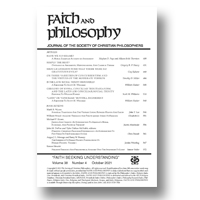|
41.
|
Faith and Philosophy:
Volume >
30 >
Issue: 1
William Lane Craig, David P. Hunt
Perils of the Open Road
abstract |
view |
rights & permissions
| cited by
Open theists deny that God knows future contingents. Most open theists justify this denial by adopting the position that there are no future contingent truths to be known. In this paper we examine some of the arguments put forward for this position in two recent articles in this journal, one by Dale Tuggy and one by Alan Rhoda, Gregory Boyd, and Thomas Belt. The arguments concern time, modality, and the semantics of ‘will’ statements. We explain why we find none of these arguments persuasive. This wide road leads only to destruction.
|
|
|
42.
|
Faith and Philosophy:
Volume >
30 >
Issue: 1
Joseph Corabi, Rebecca Germino
Prophecy, Foreknowledge, and Middle Knowledge
abstract |
view |
rights & permissions
| cited by
Largely following on the heels of Thomas Flint’s book-length defense of Molinism a number of years ago, a debate has emerged about the ability of Molinism to explain God’s purported ability to successfully prophesy the occurrence of human free choices, as well as about the merits of other theories of divine providence and foreknowledge in this respect. After introducing the relevant issues, we criticize Alexander Pruss’s recent attempt to show that non-Molinist views which countenance only simple foreknowledge fare as well as Molinism in explaining prophecy. We locate two serious problems with Pruss’s proposal, and in the process clarify the theoretical costs and benefits of an adequate Molinist account in this sphere.
|
|
|
43.
|
Faith and Philosophy:
Volume >
30 >
Issue: 1
Shawn Graves
The Self-undermining Objection to the Epistemology of Disagreement
abstract |
view |
rights & permissions
| cited by
Disagreements about, within, and between religions are widespread. It’s no surprise, then, that there’s an enormous philosophical literature on religious diversity. But in recent years, philosophers working in mainstream epistemology have done a lot of work on disagreement in general. This work has focused in particular upon the epistemology of peer disagreement, i.e., disagreements between parties who are justifiably believed to be epistemic equals regarding the matter at hand. In this paper, I intend to defend a thesis in the epistemology of peer disagreement from a significant objection. The thesis I intend to defend is the Equal Weight View (EWV). The objection, pressed by philosophers such as Alvin Plantinga, Timothy O’Connor, Charles Taliaferro, Brian Weatherson, and Adam Elga, is that EWV is self-undermining. In short, I argue two things. First, I argue that EWV is not self-undermining. Second, I argue that even if it were, this would give us no reason to think that EWV is false since there are obviously true epistemic principles that self-undermine (or at least do so potentially). The self-undermining objection to EWV fails.
|
|
